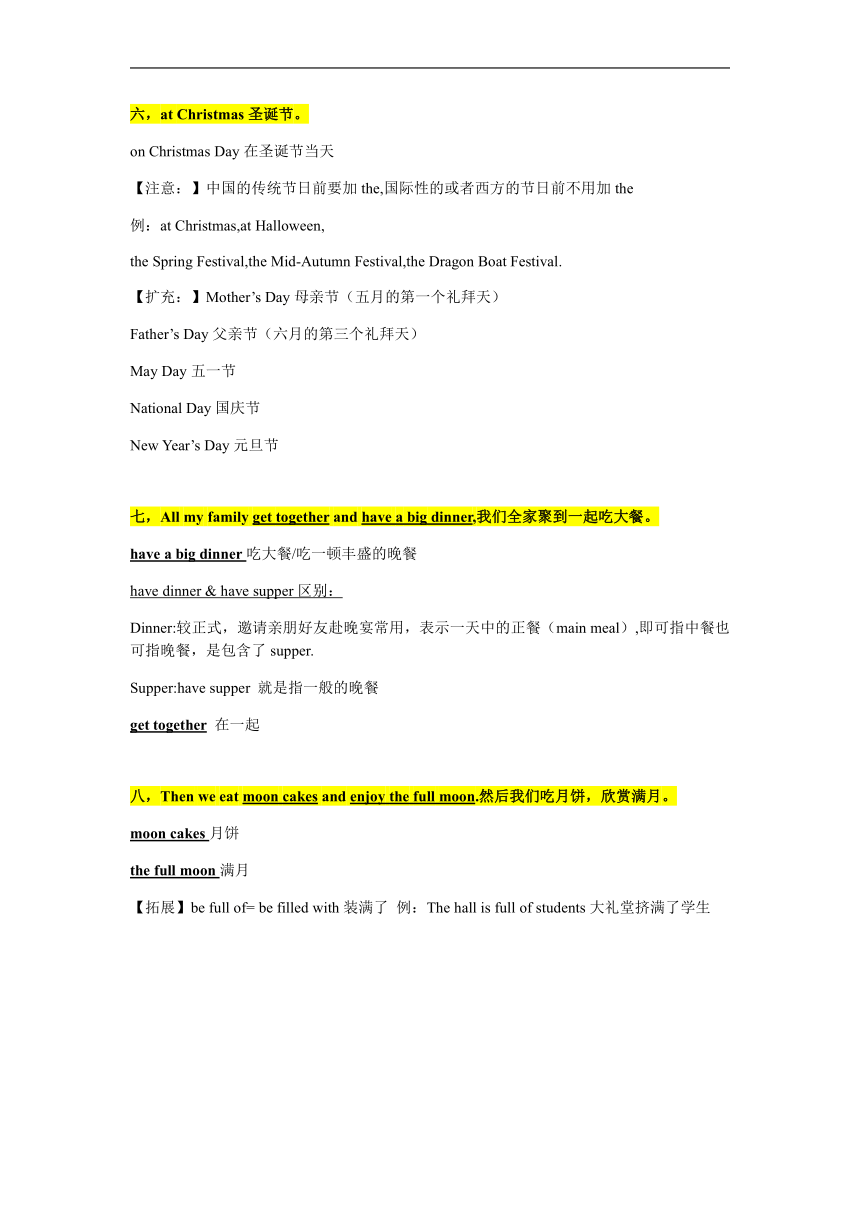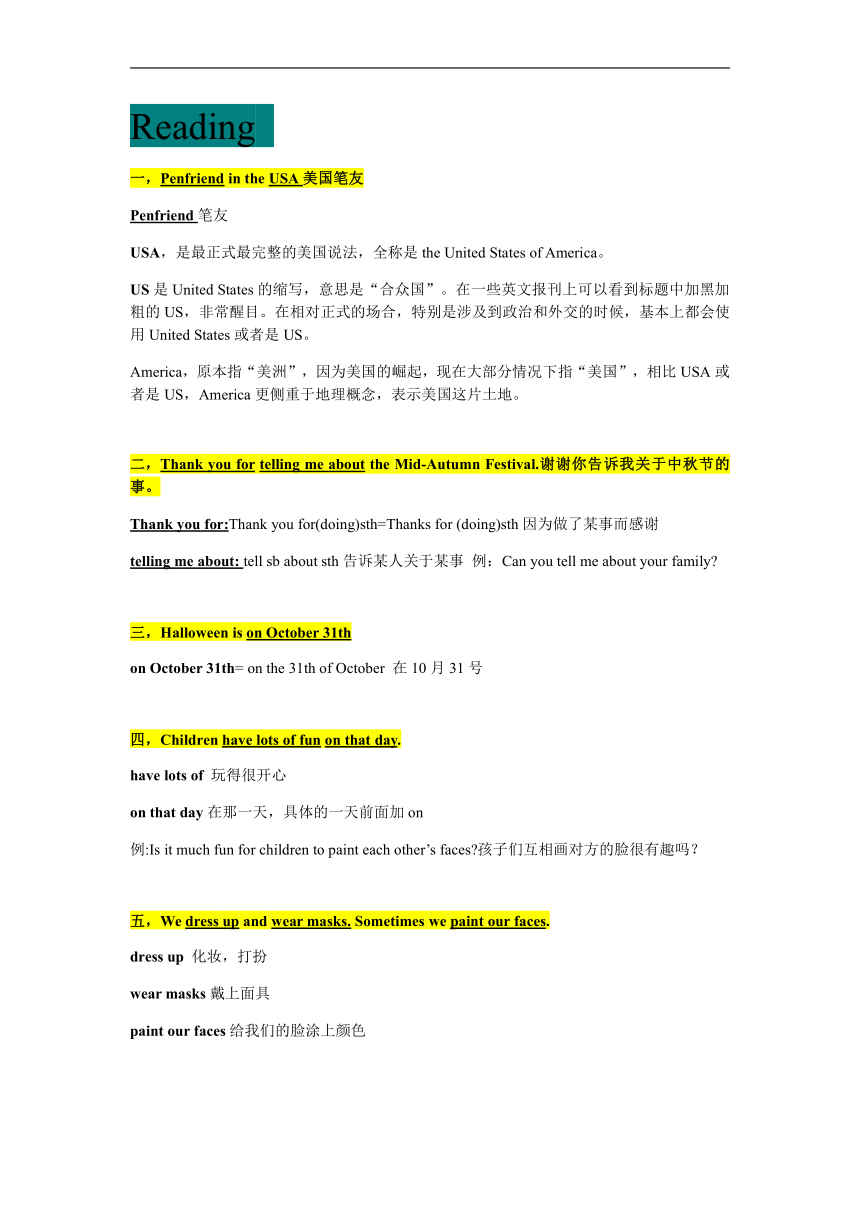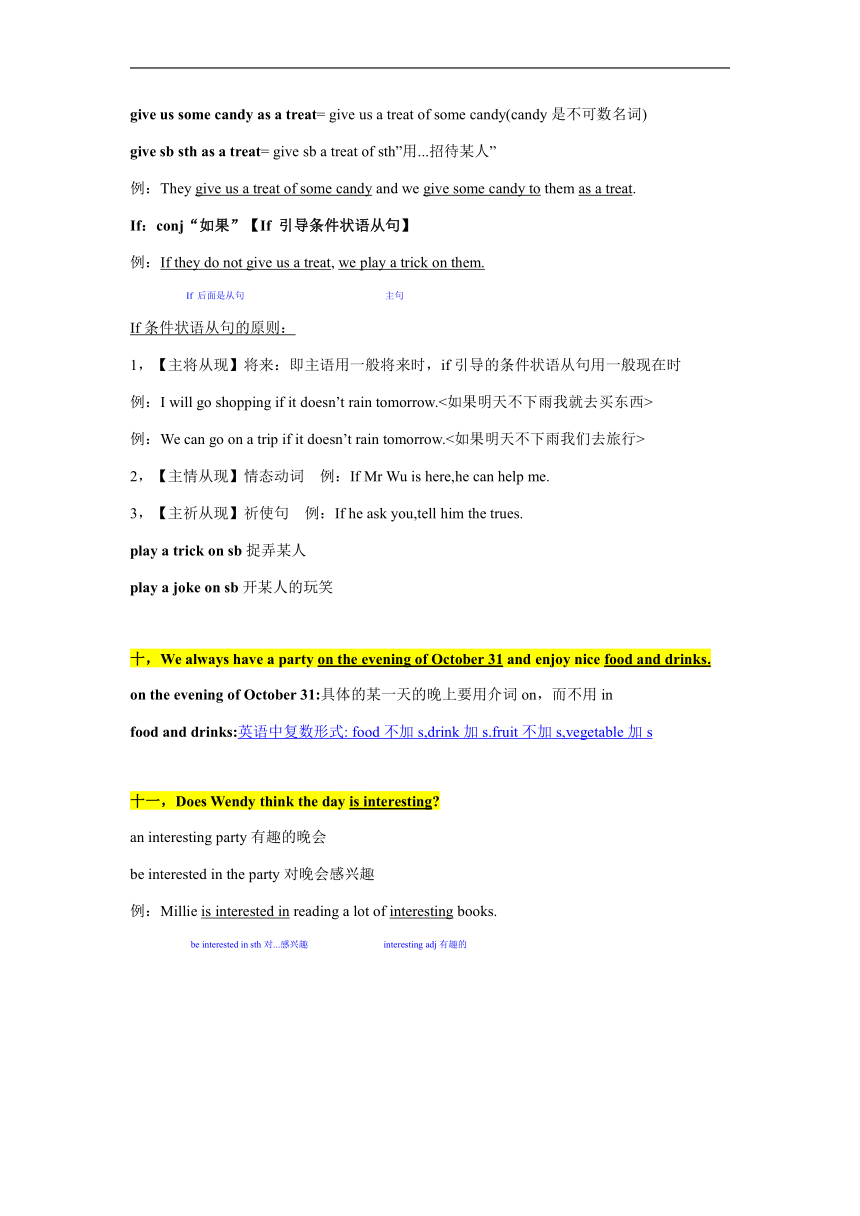牛津译林版七年级上册Unit 5 Let's celebrate复习(重难点归纳)
文档属性
| 名称 | 牛津译林版七年级上册Unit 5 Let's celebrate复习(重难点归纳) |

|
|
| 格式 | zip | ||
| 文件大小 | 43.6KB | ||
| 资源类型 | 教案 | ||
| 版本资源 | 牛津译林版 | ||
| 科目 | 英语 | ||
| 更新时间 | 2022-12-10 00:00:00 | ||
图片预览





文档简介
Unit 5 Let's celebrate复习(重难点归纳)
Comic strip
Welcome to the unit
一. Let’s celebrate.让我们一起庆祝吧。
Celebrate vt 动词”庆祝,祝贺”,celebration-n名词”庆祝活动”
例:Here is a poster for this year’s Chinese New Year celebrations in the New York
have a guess猜一猜 例:Let’s have a guess.
I want to dress up as a ghost我想要打扮成一个幽灵
关于dress的短语:
dress up化妆,打扮
dress up as打扮成,装扮成...
dress up like打扮得像... 例: I like to dress up like a movie star.
dress sb给某人穿衣服 例:She has no time to dress her son this morning.
be/get dressed in=wear=have...on+衣服 穿着...衣服 例:Sandy dress up in beautiful clothes.
Millie learns about different festival around the world.米莉了解了世界各地不同的节日。
learns about”了解,学习”
around the world=all over the world
What’s your favourite festival 你最喜欢的节日是什么。
=What festival do you like best
favourite =like best,还可以写成 favorite<美> ,前面要用形容词性物主代词或者名词所有格 例:Peter’s favourite sport is swimming
at Christmas圣诞节。
on Christmas Day在圣诞节当天
【注意:】中国的传统节日前要加the,国际性的或者西方的节日前不用加the
例:at Christmas,at Halloween,
the Spring Festival,the Mid-Autumn Festival,the Dragon Boat Festival.
【扩充:】Mother’s Day母亲节(五月的第一个礼拜天)
Father’s Day父亲节(六月的第三个礼拜天)
May Day五一节
National Day国庆节
New Year’s Day元旦节
All my family get together and have a big dinner,我们全家聚到一起吃大餐。
have a big dinner吃大餐/吃一顿丰盛的晚餐
have dinner & have supper区别:
Dinner:较正式,邀请亲朋好友赴晚宴常用,表示一天中的正餐(main meal),即可指中餐也可指晚餐,是包含了supper.
Supper:have supper 就是指一般的晚餐
get together 在一起
Then we eat moon cakes and enjoy the full moon.然后我们吃月饼,欣赏满月。
moon cakes月饼
the full moon满月
【拓展】be full of= be filled with装满了 例:The hall is full of students大礼堂挤满了学生
Reading
Penfriend in the USA美国笔友
Penfriend笔友
USA,是最正式最完整的美国说法,全称是the United States of America。
US是United States的缩写,意思是“合众国”。在一些英文报刊上可以看到标题中加黑加粗的US,非常醒目。在相对正式的场合,特别是涉及到政治和外交的时候,基本上都会使用United States或者是US。
America,原本指“美洲”,因为美国的崛起,现在大部分情况下指“美国”,相比USA或者是US,America更侧重于地理概念,表示美国这片土地。
Thank you for telling me about the Mid-Autumn Festival.谢谢你告诉我关于中秋节的事。
Thank you for:Thank you for(doing)sth=Thanks for (doing)sth因为做了某事而感谢
telling me about: tell sb about sth告诉某人关于某事 例:Can you tell me about your family
Halloween is on October 31th
on October 31th= on the 31th of October 在10月31号
Children have lots of fun on that day.
have lots of 玩得很开心
on that day在那一天,具体的一天前面加on
例:Is it much fun for children to paint each other’s faces 孩子们互相画对方的脸很有趣吗?
We dress up and wear masks. Sometimes we paint our faces.
dress up 化妆,打扮
wear masks戴上面具
paint our faces给我们的脸涂上颜色
We also make pumpkin lanterns我们也做南瓜灯笼
=make lanterns out of pumpkins用南瓜制成灯笼
【关于make】
make...out of...用...制成<可以看出原材料>例:make planes out of paper用纸做飞机。
make...from...用...制成<不能看出原材料>例:make paper from wood用树木造纸。
When the evening comes,we visit houses and play a game with the people inside.
When”当...的时候”【引导时间状语从句】
visit houses串门
play a game with the people inside和里面的人做游戏
We knock on their door and shout”trick or treat”.
knock on their door:knock on/at people’s door敲人们的门
Shout:shout to...对某人大喊
例:When they saw smoke coming from the house,they began to shout to the people inside.
Usually they give us some candy as a treat.If they do not give us a treat,we play a trick on them通常他们会给我们一些糖果作为款待。如果他们不招待我们,我们就捉弄他们。.
Usually 通常,频度副词
关于频度副词:
1,一般放在行为动词的前面,助动词/情态动词和 be 动词的后面:
2,频度副词有哪些:
always”总是 100%”
usually”通常”80%
often”经常,常常”60%
sometimes”有时”40%
seldom”很少”20%
never”从不”0%
give us some candy as a treat= give us a treat of some candy(candy是不可数名词)
give sb sth as a treat= give sb a treat of sth”用...招待某人”
例:They give us a treat of some candy and we give some candy to them as a treat.
If:conj“如果”【If 引导条件状语从句】
例:If they do not give us a treat, we play a trick on them.
If 后面是从句 主句
If条件状语从句的原则:
【主将从现】将来:即主语用一般将来时,if引导的条件状语从句用一般现在时
例:I will go shopping if it doesn’t rain tomorrow.<如果明天不下雨我就去买东西>
例:We can go on a trip if it doesn’t rain tomorrow.<如果明天不下雨我们去旅行>
【主情从现】情态动词 例:If Mr Wu is here,he can help me.
【主祈从现】祈使句 例:If he ask you,tell him the trues.
play a trick on sb捉弄某人
play a joke on sb开某人的玩笑
We always have a party on the evening of October 31 and enjoy nice food and drinks.
on the evening of October 31:具体的某一天的晚上要用介词on,而不用in
food and drinks:英语中复数形式: food不加s,drink加s.fruit不加s,vegetable加s
Does Wendy think the day is interesting
an interesting party有趣的晚会
be interested in the party对晚会感兴趣
例:Millie is interested in reading a lot of interesting books.
be interested in sth对...感兴趣 interesting adj有趣的
reach: reach+sp(地点),vt及物动词后面直接加地点,不需要任何的介词
arrive: vi不及物动词,
1,可以不跟地点可以单独用做谓语.
2,后面不能直接加地点,需要介词 arrive in+大地点
arrive at+小地点
get: get to+sp(地点)
【注意】sp(地点):home/there/here这三个副词的时候,前面的介词就不需要.原本有介词的需要去掉介词。
例:Welcom to Shanghai------Welcome home
Go to school-----------------go home
arrive at the station--------arrive there
例:When did they reach Shanghai They arrived there at 2:00p.m.
三,They are all nice to me他们都对我很好。
【结构】be+形容词+to sb.:对某人怎么样,
be nice/kind/friendly to sb对某人友好。
形容词kind:友善的,nice:好的,friendly:友好的
We often chat with each other or play in the playground我们经常互相聊天或者在操场上玩
chat with sb和某人聊天
each other用法:
each other’s”彼此的”,是each other的所有格 例:Write each other’s name.写下彼此的名字
例:help each other互相帮助,learn from each other互相学习
in the playground=on the playground在操场上
五,I am in the school volleyball team.我是学校排球队的。
in=a member of 一名成员
例:Millie is a member of the school volleyball team
Best wishes 最美好的祝福。
Wish n名词”祝愿”
Best wishes to sb 向某人致以最美好的祝福。例:Best wishes to you.
Best wishes for sth 向某事致以最美好的祝福. 例:Best wishes for the new year.
Wish和hope的区别:
wish:”但愿”难以实现的,一般侧重于表示不大可能或难以实现的”愿望”
hope:”希望”可实现的,对实现有一定信心的希望,多指可以达到的事”希望”
Wish&hope都可接动词不定式 wish to do sth
Hope to do sth
hope to do sth希望做某事 例:I hope to become a teacher
注意:希望某人做某事要用wish sb to do sth, 不能用hope sb to do sth【hope后不能接双宾语】
【wish宾语从句】难以实现的”愿望”常用过去式
例:I wish I knew the answer我真希望我知道这个答案(实际上不知道)
例:I wish(that) I could fly我希望我能飞(其实是不可能的)
【hope(that)宾语从句】此处省略了that. 可实现的”希望”。
例:Our English teacher hopes we study hard at English.我们的英语老师希望我们那里学习英语
例:I hope he can do that我希望他能干那件事情
Integrated skills
一,Millie is talking with Simon about a volleyball match. Millie正在和Simon谈论排球比赛
Talk with/to sb和某人说话
区别 tell,speak,say,talk:
1,tell“告诉”注重说话的内容,又有告诉的对象
tell sb sth=tell sth to sb 【tell 后接双宾语】例:Tell me what the story is like.
2,speak”讲,说,发言”侧重讲话的动作而非内容.
speak+ 语言/speakto sb 例:He can speak three languages.
3,say “说,讲”指用语言表达思想,侧重于所说的具体内容.
say sth to sb/say to sb”...”例:he said thanks to the young man.
4,talk”谈话”,指双方之间的相互交谈.
talk to/with sb 例:They are talking over the phone.
二,There is a volleyball match between Sunshine Middle School and Moonlight Middle School阳光中学和月光中学之间有一场排球比赛。
There be句型:There be 后面的名词是句子的主语,所以There be 句型属于倒装句。
1,定义:英语中常用的句型,意思是"有",There在此结构中是引导词,已经没有副词"那里"的含义。表示:某地有某人或某物,强调"存在"。
2,肯定形式:There be+主语+地点/时间状语
There is+可数名词单数/不可数名词
There are+可数名词复数
**注意:
There be 有特点,主语放在be后面,就近原则是重点,单数is复数are.
变否定很简单,be后要把not添,变疑问也不难,把be提到there前。
肯定句中用some,否定和疑问句中用any.
Between:介词,表示两者之间,有时也可用于三者以上,强调两两之间的关系
例:What do you often do between classes 表示课间
三,How often do you go on a picnic 你多久去野餐一次?
go on a picnic= go for a picnic去野餐,复数形式是go on picnics
How often表示”多久一次”对频度副词提问
有关How的提问:
How often/How long/ How soon/ How far/ How much/ How many/How many times
How long表示”多久,多长”对时间或者物体的长短提问,常对for或者since引导的一段时间提问:例:for three hours,for 3 years=since 3 years ago(自从3年前一直至今)
How soon表示”多长/多少时间之后”,对将来时找中”in+时间段”提问
How far表示”离多远”,对路程和距离提问:例:three kilometres away,ten minutes’walk.
How much/ How many表示”多少”,对数量提问。对价格和金额的提问直接用How much
How many times表示”多少次”,对次数提问。
Task
一,They are good for us它们对我们有好处。
be good for/ be bad for...对...有好处/坏处
例: Too much work will be bad for you过度工作会对你有害
例: That will be bad for your health那对你的健康不利
二,They help us get ready for the day它们帮助我们为这一天做好准备.
get/be ready for sth为...准备好
get/be ready to do sth准备做某事
三,I can learn a lot about the world.我可以学到很多关于世界的东西
learn to do sth学习/学会做某事
例:I want to learn to swim this summer
a lot 许多,大量
四,We always have too much homework我们总是有太多的作业.
too much太多+不可数名词
too many太多+可数名词复数
much too 太+adj/adv 例:Today is much too cold.
**注意没有many too的用法
Grammar
【重点短语】
一,I would like to tell you about my life here.我想告诉你我在这里的生活。
Would 表示客气的建议或者邀请
Would like to do sth=want to do sth想要做某事。
life n名词”生活”=复数形式lives
My friend and I always have great fun then我的朋友和我总是玩得很开心。
have great fun =have a good time玩得开心
三,How often do they exercise 他们多久锻炼一次?
关于频度副词:
1,一般放在行为动词的前面,助动词/情态动词和be动词的后面:
2,频度副词有哪些:
always”总是100%”
usually”通常”80%
often”经常,常常”60%
sometimes”有时”40%
seldom”很少”20%
never”从不”0%
3,用How often提问的词还有 ①频度副词 ②every day/week ③once a week/month/year
例:How often do you go to see a film -- Seldom.
4,once/ twice /基数词+times+一段时间,仅对次数提问用How many times
例:How many times do you watch TV a week 你一个星期看几次电视?---Three times.
表示时间的介词(in/on/at)
我们可以在不同的时间前面使用in,on,at来表示做没事的时间。
1,in:一般用在”大于”一天 例:in 2022/ in August/ In summer
2,on:一般用在”等于”一天,具体的每一天前面 例:on Sunday/ on 1 August/ on Children’s Day
3,at:用在”某一时刻”,年龄,如果节日时间不止一天而是持续一段时间也用at
例:at seven o’clock/ at 6 years old/ at Christmas/ at the Spring Festival
**记忆小诀窍:
in年in月in四季,on日on号on星期,at加具体时间点
三长两短是例外:in the morning/afternoon/evening,at noon,at night
有些时间前不加时间介词,比如:last night,this morning,next weekend,every sunday 等
Comic strip
Welcome to the unit
一. Let’s celebrate.让我们一起庆祝吧。
Celebrate vt 动词”庆祝,祝贺”,celebration-n名词”庆祝活动”
例:Here is a poster for this year’s Chinese New Year celebrations in the New York
have a guess猜一猜 例:Let’s have a guess.
I want to dress up as a ghost我想要打扮成一个幽灵
关于dress的短语:
dress up化妆,打扮
dress up as打扮成,装扮成...
dress up like打扮得像... 例: I like to dress up like a movie star.
dress sb给某人穿衣服 例:She has no time to dress her son this morning.
be/get dressed in=wear=have...on+衣服 穿着...衣服 例:Sandy dress up in beautiful clothes.
Millie learns about different festival around the world.米莉了解了世界各地不同的节日。
learns about”了解,学习”
around the world=all over the world
What’s your favourite festival 你最喜欢的节日是什么。
=What festival do you like best
favourite =like best,还可以写成 favorite<美> ,前面要用形容词性物主代词或者名词所有格 例:Peter’s favourite sport is swimming
at Christmas圣诞节。
on Christmas Day在圣诞节当天
【注意:】中国的传统节日前要加the,国际性的或者西方的节日前不用加the
例:at Christmas,at Halloween,
the Spring Festival,the Mid-Autumn Festival,the Dragon Boat Festival.
【扩充:】Mother’s Day母亲节(五月的第一个礼拜天)
Father’s Day父亲节(六月的第三个礼拜天)
May Day五一节
National Day国庆节
New Year’s Day元旦节
All my family get together and have a big dinner,我们全家聚到一起吃大餐。
have a big dinner吃大餐/吃一顿丰盛的晚餐
have dinner & have supper区别:
Dinner:较正式,邀请亲朋好友赴晚宴常用,表示一天中的正餐(main meal),即可指中餐也可指晚餐,是包含了supper.
Supper:have supper 就是指一般的晚餐
get together 在一起
Then we eat moon cakes and enjoy the full moon.然后我们吃月饼,欣赏满月。
moon cakes月饼
the full moon满月
【拓展】be full of= be filled with装满了 例:The hall is full of students大礼堂挤满了学生
Reading
Penfriend in the USA美国笔友
Penfriend笔友
USA,是最正式最完整的美国说法,全称是the United States of America。
US是United States的缩写,意思是“合众国”。在一些英文报刊上可以看到标题中加黑加粗的US,非常醒目。在相对正式的场合,特别是涉及到政治和外交的时候,基本上都会使用United States或者是US。
America,原本指“美洲”,因为美国的崛起,现在大部分情况下指“美国”,相比USA或者是US,America更侧重于地理概念,表示美国这片土地。
Thank you for telling me about the Mid-Autumn Festival.谢谢你告诉我关于中秋节的事。
Thank you for:Thank you for(doing)sth=Thanks for (doing)sth因为做了某事而感谢
telling me about: tell sb about sth告诉某人关于某事 例:Can you tell me about your family
Halloween is on October 31th
on October 31th= on the 31th of October 在10月31号
Children have lots of fun on that day.
have lots of 玩得很开心
on that day在那一天,具体的一天前面加on
例:Is it much fun for children to paint each other’s faces 孩子们互相画对方的脸很有趣吗?
We dress up and wear masks. Sometimes we paint our faces.
dress up 化妆,打扮
wear masks戴上面具
paint our faces给我们的脸涂上颜色
We also make pumpkin lanterns我们也做南瓜灯笼
=make lanterns out of pumpkins用南瓜制成灯笼
【关于make】
make...out of...用...制成<可以看出原材料>例:make planes out of paper用纸做飞机。
make...from...用...制成<不能看出原材料>例:make paper from wood用树木造纸。
When the evening comes,we visit houses and play a game with the people inside.
When”当...的时候”【引导时间状语从句】
visit houses串门
play a game with the people inside和里面的人做游戏
We knock on their door and shout”trick or treat”.
knock on their door:knock on/at people’s door敲人们的门
Shout:shout to...对某人大喊
例:When they saw smoke coming from the house,they began to shout to the people inside.
Usually they give us some candy as a treat.If they do not give us a treat,we play a trick on them通常他们会给我们一些糖果作为款待。如果他们不招待我们,我们就捉弄他们。.
Usually 通常,频度副词
关于频度副词:
1,一般放在行为动词的前面,助动词/情态动词和 be 动词的后面:
2,频度副词有哪些:
always”总是 100%”
usually”通常”80%
often”经常,常常”60%
sometimes”有时”40%
seldom”很少”20%
never”从不”0%
give us some candy as a treat= give us a treat of some candy(candy是不可数名词)
give sb sth as a treat= give sb a treat of sth”用...招待某人”
例:They give us a treat of some candy and we give some candy to them as a treat.
If:conj“如果”【If 引导条件状语从句】
例:If they do not give us a treat, we play a trick on them.
If 后面是从句 主句
If条件状语从句的原则:
【主将从现】将来:即主语用一般将来时,if引导的条件状语从句用一般现在时
例:I will go shopping if it doesn’t rain tomorrow.<如果明天不下雨我就去买东西>
例:We can go on a trip if it doesn’t rain tomorrow.<如果明天不下雨我们去旅行>
【主情从现】情态动词 例:If Mr Wu is here,he can help me.
【主祈从现】祈使句 例:If he ask you,tell him the trues.
play a trick on sb捉弄某人
play a joke on sb开某人的玩笑
We always have a party on the evening of October 31 and enjoy nice food and drinks.
on the evening of October 31:具体的某一天的晚上要用介词on,而不用in
food and drinks:英语中复数形式: food不加s,drink加s.fruit不加s,vegetable加s
Does Wendy think the day is interesting
an interesting party有趣的晚会
be interested in the party对晚会感兴趣
例:Millie is interested in reading a lot of interesting books.
be interested in sth对...感兴趣 interesting adj有趣的
reach: reach+sp(地点),vt及物动词后面直接加地点,不需要任何的介词
arrive: vi不及物动词,
1,可以不跟地点可以单独用做谓语.
2,后面不能直接加地点,需要介词 arrive in+大地点
arrive at+小地点
get: get to+sp(地点)
【注意】sp(地点):home/there/here这三个副词的时候,前面的介词就不需要.原本有介词的需要去掉介词。
例:Welcom to Shanghai------Welcome home
Go to school-----------------go home
arrive at the station--------arrive there
例:When did they reach Shanghai They arrived there at 2:00p.m.
三,They are all nice to me他们都对我很好。
【结构】be+形容词+to sb.:对某人怎么样,
be nice/kind/friendly to sb对某人友好。
形容词kind:友善的,nice:好的,friendly:友好的
We often chat with each other or play in the playground我们经常互相聊天或者在操场上玩
chat with sb和某人聊天
each other用法:
each other’s”彼此的”,是each other的所有格 例:Write each other’s name.写下彼此的名字
例:help each other互相帮助,learn from each other互相学习
in the playground=on the playground在操场上
五,I am in the school volleyball team.我是学校排球队的。
in=a member of 一名成员
例:Millie is a member of the school volleyball team
Best wishes 最美好的祝福。
Wish n名词”祝愿”
Best wishes to sb 向某人致以最美好的祝福。例:Best wishes to you.
Best wishes for sth 向某事致以最美好的祝福. 例:Best wishes for the new year.
Wish和hope的区别:
wish:”但愿”难以实现的,一般侧重于表示不大可能或难以实现的”愿望”
hope:”希望”可实现的,对实现有一定信心的希望,多指可以达到的事”希望”
Wish&hope都可接动词不定式 wish to do sth
Hope to do sth
hope to do sth希望做某事 例:I hope to become a teacher
注意:希望某人做某事要用wish sb to do sth, 不能用hope sb to do sth【hope后不能接双宾语】
【wish宾语从句】难以实现的”愿望”常用过去式
例:I wish I knew the answer我真希望我知道这个答案(实际上不知道)
例:I wish(that) I could fly我希望我能飞(其实是不可能的)
【hope(that)宾语从句】此处省略了that. 可实现的”希望”。
例:Our English teacher hopes we study hard at English.我们的英语老师希望我们那里学习英语
例:I hope he can do that我希望他能干那件事情
Integrated skills
一,Millie is talking with Simon about a volleyball match. Millie正在和Simon谈论排球比赛
Talk with/to sb和某人说话
区别 tell,speak,say,talk:
1,tell“告诉”注重说话的内容,又有告诉的对象
tell sb sth=tell sth to sb 【tell 后接双宾语】例:Tell me what the story is like.
2,speak”讲,说,发言”侧重讲话的动作而非内容.
speak+ 语言/speakto sb 例:He can speak three languages.
3,say “说,讲”指用语言表达思想,侧重于所说的具体内容.
say sth to sb/say to sb”...”例:he said thanks to the young man.
4,talk”谈话”,指双方之间的相互交谈.
talk to/with sb 例:They are talking over the phone.
二,There is a volleyball match between Sunshine Middle School and Moonlight Middle School阳光中学和月光中学之间有一场排球比赛。
There be句型:There be 后面的名词是句子的主语,所以There be 句型属于倒装句。
1,定义:英语中常用的句型,意思是"有",There在此结构中是引导词,已经没有副词"那里"的含义。表示:某地有某人或某物,强调"存在"。
2,肯定形式:There be+主语+地点/时间状语
There is+可数名词单数/不可数名词
There are+可数名词复数
**注意:
There be 有特点,主语放在be后面,就近原则是重点,单数is复数are.
变否定很简单,be后要把not添,变疑问也不难,把be提到there前。
肯定句中用some,否定和疑问句中用any.
Between:介词,表示两者之间,有时也可用于三者以上,强调两两之间的关系
例:What do you often do between classes 表示课间
三,How often do you go on a picnic 你多久去野餐一次?
go on a picnic= go for a picnic去野餐,复数形式是go on picnics
How often表示”多久一次”对频度副词提问
有关How的提问:
How often/How long/ How soon/ How far/ How much/ How many/How many times
How long表示”多久,多长”对时间或者物体的长短提问,常对for或者since引导的一段时间提问:例:for three hours,for 3 years=since 3 years ago(自从3年前一直至今)
How soon表示”多长/多少时间之后”,对将来时找中”in+时间段”提问
How far表示”离多远”,对路程和距离提问:例:three kilometres away,ten minutes’walk.
How much/ How many表示”多少”,对数量提问。对价格和金额的提问直接用How much
How many times表示”多少次”,对次数提问。
Task
一,They are good for us它们对我们有好处。
be good for/ be bad for...对...有好处/坏处
例: Too much work will be bad for you过度工作会对你有害
例: That will be bad for your health那对你的健康不利
二,They help us get ready for the day它们帮助我们为这一天做好准备.
get/be ready for sth为...准备好
get/be ready to do sth准备做某事
三,I can learn a lot about the world.我可以学到很多关于世界的东西
learn to do sth学习/学会做某事
例:I want to learn to swim this summer
a lot 许多,大量
四,We always have too much homework我们总是有太多的作业.
too much太多+不可数名词
too many太多+可数名词复数
much too 太+adj/adv 例:Today is much too cold.
**注意没有many too的用法
Grammar
【重点短语】
一,I would like to tell you about my life here.我想告诉你我在这里的生活。
Would 表示客气的建议或者邀请
Would like to do sth=want to do sth想要做某事。
life n名词”生活”=复数形式lives
My friend and I always have great fun then我的朋友和我总是玩得很开心。
have great fun =have a good time玩得开心
三,How often do they exercise 他们多久锻炼一次?
关于频度副词:
1,一般放在行为动词的前面,助动词/情态动词和be动词的后面:
2,频度副词有哪些:
always”总是100%”
usually”通常”80%
often”经常,常常”60%
sometimes”有时”40%
seldom”很少”20%
never”从不”0%
3,用How often提问的词还有 ①频度副词 ②every day/week ③once a week/month/year
例:How often do you go to see a film -- Seldom.
4,once/ twice /基数词+times+一段时间,仅对次数提问用How many times
例:How many times do you watch TV a week 你一个星期看几次电视?---Three times.
表示时间的介词(in/on/at)
我们可以在不同的时间前面使用in,on,at来表示做没事的时间。
1,in:一般用在”大于”一天 例:in 2022/ in August/ In summer
2,on:一般用在”等于”一天,具体的每一天前面 例:on Sunday/ on 1 August/ on Children’s Day
3,at:用在”某一时刻”,年龄,如果节日时间不止一天而是持续一段时间也用at
例:at seven o’clock/ at 6 years old/ at Christmas/ at the Spring Festival
**记忆小诀窍:
in年in月in四季,on日on号on星期,at加具体时间点
三长两短是例外:in the morning/afternoon/evening,at noon,at night
有些时间前不加时间介词,比如:last night,this morning,next weekend,every sunday 等
同课章节目录
- 预备课程
- Lesson 1 Nice to meet you !
- Lesson 2 A happy family
- Lesson 3 A nice school
- Lesson 4 You look cool !
- Lesson 5 Wonderful things
- Lesson 6 Have nice food
- Lesson 7 Enjoy our days
- Lesson 8 Let's have fun !
- Unit 1 This is me
- Unit 2 Let's play sports
- Unit 3 Welcome to our school
- Unit 4 My day
- Unit 5 Let’s celebrate
- Unit 6 Food and lifestyle
- Unit 7 Shopping
- Unit 8 Fashion
